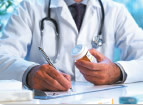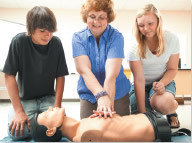
5 timeless habits for better health

What are the symptoms of prostate cancer?

Is your breakfast cereal healthy?

When pain signals an emergency: Symptoms you should never ignore

Does exercise give you energy?

Acupuncture for pain relief: How it works and what to expect

How to avoid jet lag: Tips for staying alert when you travel

Biofeedback therapy: How it works and how it can help relieve pain

Best vitamins and minerals for energy

Should you take probiotics with antibiotics?
Heart Health Archive
Articles
CPR during cardiac arrest: someone’s life is in your hands
Cardiac arrest is the ultimate 911 emergency. The heart stops sending blood to the body. Death occurs in minutes — unless a bystander takes matters into his or her hands and starts cardiopulmonary resuscitation (CPR). This keeps blood circulating until trained and better-equipped first responders arrive on the scene to jump-start the heart back into a normal rhythm. Two new studies in JAMA provide compelling proof that efforts to train people to do life-saving CPR pay off. Many organizations sponsor CPR and AED training programs. Two notable ones are the American Heart Association and the American Red Cross. Many local departments of public health also provide CPR training, including “friends and family” classes for people close to someone at risk of cardiac arrest. The investment of time and effort to learn CPR is small. The potential payoff — saving a life — is huge.
Bypass surgery an “uncommon” cause of memory loss, cognitive decline
Coronary artery bypass surgery (CABG) offers a new lease on life for thousands of people each year. But it has also been blamed for “brain fog,” a loss of memory and thinking skills that follows the procedure in some people. Such brain problems are often called “cognitive impairment.” But the operation itself may not be to blame, according to a review in today’s Annals of Internal Medicine. A team of mostly Veteran’s Affairs researchers concluded that intermediate and long-term cognitive impairment after cardiovascular procedures “may be uncommon.” That said, they recommend that anyone thinking about open-heart surgery or other large cardiovascular procedure should discuss with the surgeon the possibility of cognitive impairment.
Mediterranean diet: Good for your mind and your heart
Plant-based compounds known as polyphenols are plentiful in the Mediterranean diet, which may explain its health benefits. |
Extra-virgin olive oil and nuts seem to contribute to the benefits.
Ask the doctor: Understanding ejection fraction
Q . Can you explain exactly what "ejection fraction" means? And is there any way to increase it?
A. Ejection fraction refers to the volume of blood that's pumped out of the heart's left ventricle each time it contracts. Contrary to what many people believe, a normal ejection fraction is not 100%. Even a healthy heart pumps out only about half to two-thirds of the volume of blood in the chamber in one heartbeat. So a normal ejection fraction lies somewhere in the range of 55% to 65%.
Ask the doctor: Clot prevention drugs after a stent: How long?
Guidelines about how long to take clopidogrel after receiving a stent are in flux. Image: Thinkstock |
Q. My cardiologist told me to take clopidogrel for a year after I received a stent. Now the year is up. I haven't had any bleeding problems. Should I keep taking it?
A. In addition to aspirin, doctors routinely prescribe clopidogrel (Plavix) for people who receive stents, the tiny metal mesh tubes placed in clogged blood vessels to improve blood flow. This medication stops blood components called platelets from clumping together and forming clots. The current guidelines generally recommend that people take the drug for a year. This advice assumes they don't have any side effects such as unusual bleeding, which can show up as severe nosebleeds or blood in the urine or stools. However, these guidelines are still evolving. Experts are currently reviewing new findings from large studies on the benefits and risks of taking clopidogrel and similar drugs for extended periods of time.
Don't worry about sudden cardiac arrest during exercise
Getting regular exercise is the best way to prevent most types of heart disease—including sudden cardiac arrest. Images: Thinkstock |
New findings may help allay fears about sports-related heart death.
Race and ethnicity: Clues to your heart disease risk?
Your racial and ethnic heritage may influence your heart disease risk, but lifestyle habits play a bigger role. Image: Thinkstock |
Rates of high blood pressure, diabetes, and heart disease vary among people of different backgrounds.
Too darn hot for your heart?
Dress for summer's heat, and don't stay outside too long. Image: Thinkstock |
Summer's heat, humidity, and smog may be tough for people at risk of heart disease.
Bystander CPR may help cardiac arrest survivors return to work
Cardiopulmonary resuscitation (CPR) not only saves lives, it may also help survivors of cardiac arrest recover well enough to return to work, according to a study in the May 12, 2015, issue of Circulation.
Researchers studied more than 4,300 people in Denmark who were employed before they suffered a cardiac arrest. In cardiac arrest, the heart suddenly stops working. More than 75% of survivors who had a cardiac arrest outside a hospital were able to return to work in a median time of four months. Those who received CPR from a bystander were nearly 40% more likely go back to work compared with those who didn't get CPR. The chest compressions given during CPR keep blood circulating to the brain, minimizing brain damage caused by a lack of oxygen.
Tests for hidden heart disease
Electrocardiograms, which monitor the heart's electrical patterns, don't reliably reveal the risk of having a heart attack. |
Unless you have symptoms of a heart problem, taking a cautionary look under the hood is unlikely to help—and could even be harmful.

5 timeless habits for better health

What are the symptoms of prostate cancer?

Is your breakfast cereal healthy?

When pain signals an emergency: Symptoms you should never ignore

Does exercise give you energy?

Acupuncture for pain relief: How it works and what to expect

How to avoid jet lag: Tips for staying alert when you travel

Biofeedback therapy: How it works and how it can help relieve pain

Best vitamins and minerals for energy

Should you take probiotics with antibiotics?
Free Healthbeat Signup
Get the latest in health news delivered to your inbox!
Sign Up











